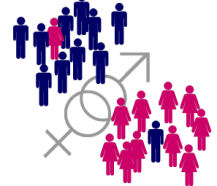 Children who exhibit behaviors outside what's considered normal for their gender face physical, psychological, and sexual abuse at home, say the authors of a report that links gender nonconformity to posttraumatic stress disorder (PTSD). The new study, led by researchers at the Harvard School of Public Health, is the first to use a population-based sample to look at gender nonconformity as a risk factor for abuse. It appears in the journal Pediatrics.
Children who exhibit behaviors outside what's considered normal for their gender face physical, psychological, and sexual abuse at home, say the authors of a report that links gender nonconformity to posttraumatic stress disorder (PTSD). The new study, led by researchers at the Harvard School of Public Health, is the first to use a population-based sample to look at gender nonconformity as a risk factor for abuse. It appears in the journal Pediatrics.
"The abuse we examined was mostly perpetrated by parents or other adults in the home. Parents need to be aware that discrimination against gender nonconformity affects one in ten kids, affects kids at a very young age, and has lasting impacts on health," said the study's lead author Andrea Roberts.
For the study, the researchers examined questionnaire data gathered from nearly 9,000 young adults with an average age of 23. The participants were asked to recall their childhood experiences, including favorite toys and games, roles they took while playing, media characters they imitated or admired, and feelings of femininity and masculinity. They were also asked about physical, sexual, or emotional abuse they experienced and were screened for PTSD.
The men who exhibited greater childhood gender nonconformity reported a higher prevalence of sexual and physical abuse before age 11 and psychological abuse between ages 11 and 17. Rates of PTSD were almost twice as high among young adults who were gender nonconforming in childhood than among those who were not.
Interestingly, the researchers found that most children who were gender nonconforming were heterosexual in adulthood (85 percent). "Our findings suggest that most of the intolerance toward gender nonconformity in children is targeted toward heterosexuals," said Roberts. She concluded by recommending that pediatricians and school health providers consider abuse screening for this vulnerable population.
Related:
Discuss this article in our forum
A Penis Doesn't Always Make A Man
Intersex - The Third Gender
New Method Of Gender Assignment For Intersex Conditions
Eat Breakfast, Conceive A Boy
Source: Harvard School of Public Health

